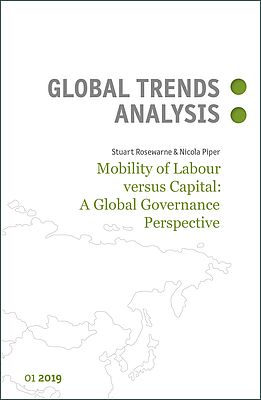
Mobility of Labour versus Capital:
A Global Governance Perspective
Stuart Rosewarne & Nicola Piper
March 2019; 25 pages
The mobility of people can engender positive effects for global economic development. Yet, migration has not been backed by an internationally-endorsed governance architecture as was the case with the liberalisation of international trade or finance. The challenge lies in advancing the development promise of international migration and reconciling it with the integrity of national sovereignty without compromising human rights.
In GLOBAL TRENDS. ANALYSIS 01|2019, Stuart Rosewarne and Nicola Piper characterise this challenge as the securitisation-liberalisation paradox that reveals itself also in the UN’s Global Compacts on Refugees and Migration. The authors therefore argue for a broader focus on migration, including a better understanding of its various forms, and a rights-based approach in migration governance.
